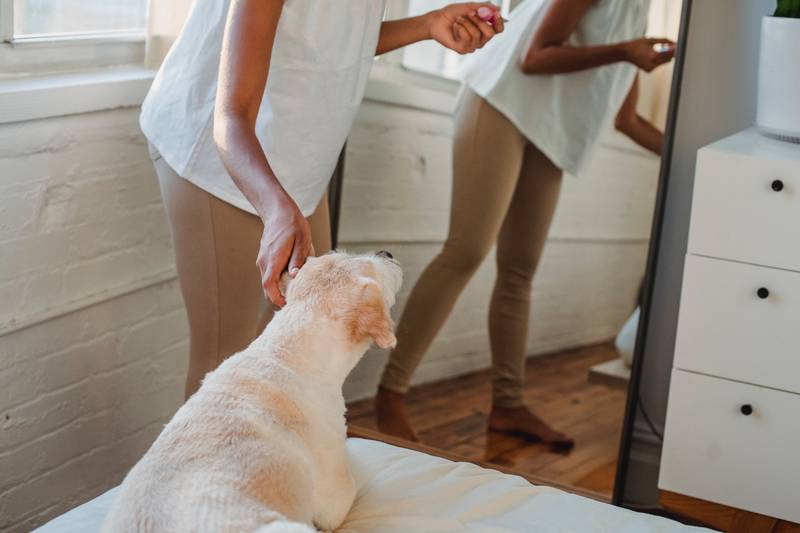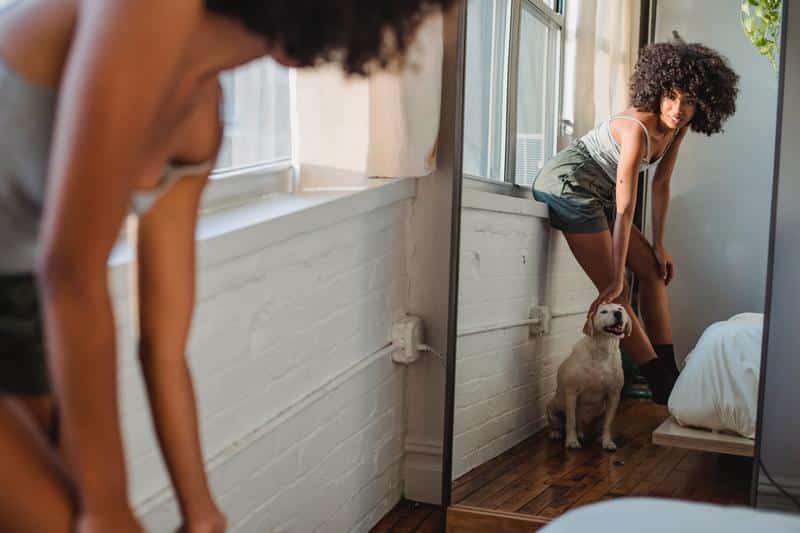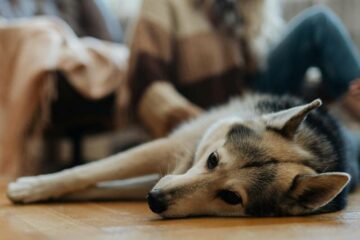Dog Barks at Reflection in Mirror? Here’s How to Stop It! [Quick & Easy]
If you’ve ever been in the room when a dog barks at the mirror, you might have found it funny at first. But when it happens constantly, it can become a bit annoying. In this article, we’ll explore some tips and tricks on how to put an end to this behavior. We’ll dive into understanding why dogs bark at their reflection, and if puppies or older dogs are more prone to this behavior. You’ll also learn about the reasons why dogs might stare at mirrors and if they can recognize themselves in a reflection.
Is your dog barking at the mirror at night or barking at their reflection in windows? We’ve got you covered. We’ll also discuss whether dogs truly understand mirrors and if they can feel fear or anger towards their own reflection. By the end of this article, you’ll have a much better understanding of your dog’s behavior and how to help them overcome their confusion with mirrors. Keep reading below for our article “Dog Barks at Reflection in Mirror? Here’s How to Stop It!”
How to Stop Dog Barking at Reflection

To stop dog barking at their reflection:
- Teach your dog the “quiet” command to use anytime they bark at their reflection or whenever you need them to pay attention and be silent.
- Practice by taking your dog to a place you know they’ll likely bark (ex. the park) with plenty of small treats.
- As soon as your dog begins barking, say “quiet” in a calm, positive voice. If they listen and get silent while also paying attention to you immediately reward them with a treat and praise.
- But if your dog keeps barking or soon starts back up again, then hide a treat within your fist.
- Put your fist right next to your dog’s nose. They’ll still be able to smell it even within your fist and will pause their barking to investigate it.
- Once they’ve quit barking and are paying you their complete attention, again say “quiet,” and then open your hand to give them praise and a small treat.
- If they continue to be silent and are giving you their focus, keep rewarding them with praise and treats.
- But if they again start barking or are not giving you their attention, repeat the steps of hiding a treat inside of your fist, placing it next to their nose, and waiting until they stop their barking and give you their attention.
- Make sure to always pause until they’ve quit barking and are paying you all their attention, and then say “quiet” before you give them any praise or treats.
- This creates a positive connection for your dog with the “quiet” command, and with staying silent and giving you their complete attention.
- With consistency, practice, and patience, you will be able to get them to behave with just the “quiet” command, and it won’t be necessary anymore to place your fist next to their mouth.
- Once your dog is doing well with just the command, then you can start increasing the amount of time you pause before you reward them.
- Start by pausing for 2 seconds, then as they do well move that up to about 5 seconds, and so on.
- Before long, you won’t need to give your dog any praise and food, and they will be silent and pay attention to you just by you giving the command.
These steps will get your dog to stop barking at mirrors, but it’s important to remember that the underlying behavioral issues (anxiety, confusion, aggression, etc) that were causing all of this to begin with will still be present. And until you address those, any positive changes you see are only going to be temporary.
“So, how do I make sure this isn’t just a quick fix?”
By getting your dog to truly choose to follow your direction, that’s how. I tried many times to write out how you can do that before deciding it made more sense to just link you to the free video series that explains it better than I’d ever be able to.
The series is by a man named Dan who is one of the world’s leading dog obedience trainers. In it, he teaches you how to put an end to things like when your dog barks at mirrors and all other misbehavior using his fast and easy-to-follow methods.
In the first video, Dan will reveal to you why the two most common methods of dog training only doom you to failure. You can watch the video now by clicking here. Follow the proven system he’ll show you in his series and you’ll never have to spend another second worrying about your dog barking at mirrors ever again!
Why Do Dogs Bark at Their Reflection?
Dogs bark at their reflection because they might perceive it as a threat or an unfamiliar presence. Since dogs don’t have the same level of self-awareness as humans, they often don’t understand that the image they’re seeing in the mirror is their own reflection. Instead, they may think they’re seeing another dog, which can trigger territorial or protective instincts, leading them to bark.
Another reason dogs bark at their reflection is confusion or curiosity. They might be puzzled by the strange “dog” in the mirror that seems to be mimicking their movements. This can lead to barking as a way of trying to communicate with or get a reaction from the reflection, especially if they’re trying to figure out whether it’s a friend or a foe.
Lastly, some dogs may bark at their reflection because they’ve learned that doing so elicits a response from their owner. If you laugh, react with surprise, or otherwise give your dog attention when they bark at the mirror, they may associate the behavior with receiving positive reinforcement.
In this case, your dog might be barking at their reflection simply because they enjoy the attention it brings. But regardless of the reason for why your dog barks at their reflection, the problem only gets worse when they’re ignoring your directions to be quiet.
If your dog does not respond to commands to stop barking at the mirror, then you’ll need to work on it through behavioral training. Doing nothing and allowing them to bark whenever they please will mean that their problem only grows and escalates until they’re barking at practically everything.
Soon, you’ll have a dog who is barking in the car, barking at thunder, barking at the cat, and maybe even barking at the wall. Obviously, this would get obnoxious very fast. It’s important that you get to work on handling things, or they may even escalate into much worse than just barking. Go back to the first section where we’ll cover how to do that.
Puppy Barking at Reflection
A puppy barking at their reflection is a common occurrence, as they’re still learning about the world around them and encountering new experiences. Puppies may bark at their reflection because they perceive it as another dog or an unfamiliar presence. This can trigger curiosity, confusion, or even defensive instincts in the young pup.
As puppies grow and develop, they may eventually learn that the reflection is not a threat and begin to ignore it. However, some puppies might continue to bark at their reflection if they receive positive reinforcement from their owner, such as attention or laughter.
To help your puppy become more comfortable with mirrors, you can gently expose them to their reflection while providing positive reinforcement for calm behavior. You should also begin teaching them the “quiet” command now, which you can do by going back to the first section of this article now.
Why Does My Dog Stare at the Mirror?

Your dog stares at the mirror because they may not recognize their reflection or may be confused by it. When dogs see their reflection in a mirror, it might be the first time they’ve ever seen another dog that looks exactly like them. This can be perplexing, and their curiosity may lead them to stare, growl, or even bark at the reflection.
It’s also possible that your dog is simply intrigued by the mirror itself. Mirrors are shiny, reflective surfaces that can catch a dog’s attention, just like other reflective objects such as water or a window. Dogs are naturally curious animals, so they might spend some time investigating this interesting new “toy” they’ve found.
Another reason your dog might be staring at the mirror is that they’re picking up on your reaction to their behavior. If you find it funny or cute when your dog looks at their reflection and reacts to it, they may pick up on your laughter or attention and repeat the behavior to receive more of your affection. So, without even realizing it, you might be encouraging your dog’s interest in the mirror.
Dog Barking at Mirror at Night
A dog barking at a mirror at night may be reacting to the reflection due to lower visibility and heightened sensitivity to their surroundings. During the nighttime, shadows and limited light can make reflections appear more distorted or unfamiliar to your dog, which can lead to confusion or even fear. This can cause them to bark, growl, or act defensively towards their reflection.
Another reason your dog might bark at a mirror at night is that they’re more alert and sensitive to unusual or unexpected stimuli. Dogs have a natural instinct to protect their home and family, so when they notice something out of the ordinary, such as their reflection in a dimly lit room, they may perceive it as a potential threat and react accordingly.
Finally, if your dog is generally more anxious or fearful in the dark, their heightened state of anxiety can make them more likely to bark at their reflection. To help your dog feel more comfortable at night and reduce their reactions to mirrors, you can use calming techniques or provide a safe, familiar space for them to rest away from reflective surfaces.
Go back to the first section of this article now where we’ll cover how to teach your dog the quiet command so they’ll stop barking at their mirror at nighttime.
Dog Barking at Their Reflection in Window
A dog barking at their reflection in a window is likely due to the same reasons they bark at mirrors – they perceive the reflection as another dog or an unfamiliar presence. Windows, like mirrors, can create reflections that dogs find confusing or threatening. The combination of the outdoor environment and their reflection might trigger territorial or protective instincts, leading your dog to bark.
Another factor that can contribute to a dog barking at their reflection in a window is the presence of other stimuli outside. They might see birds, squirrels, or people passing by, which can further heighten their excitement or alertness. In this state, they’re more likely to react to their own reflection, mistaking it for an intruder.
Lastly, if your dog has a history of barking at their reflection in windows, they might have learned that this behavior gets a response from you or others in the household. This positive reinforcement can encourage them to continue barking at their reflection, even if they don’t fully understand the cause of their own agitation.
Can Dogs See Their Reflection in a Mirror?
Yes, dogs can see their reflection in a mirror. However, their perception of the reflection may differ from ours. While humans can easily recognize their own image in a mirror, dogs often lack this level of self-awareness. Instead, they may see the reflection as another dog or an unfamiliar presence, which can lead to curiosity, confusion, or even aggression.
Dogs primarily rely on their sense of smell to identify other animals, so the lack of scent cues from their reflection can contribute to their confusion. Their visual processing is also different from ours, with a stronger focus on movement and contrast. This might affect their ability to fully understand the nature of their reflection in a mirror.
Do Dogs Understand Mirrors?
Most dogs don’t fully understand mirrors and the concept of their own reflection. While some dogs may eventually learn to ignore the mirror or figure out that the reflection isn’t a threat, they typically don’t possess the self-recognition abilities that humans do. This is because dogs primarily rely on their sense of smell to identify other animals, and their reflection doesn’t provide the corresponding scent cues they would expect.
It’s important to note that dogs are individuals, and their understanding of mirrors can vary. Some dogs may become more accustomed to mirrors over time and exhibit less interest or reaction to their reflection, while others may continue to be fascinated or confused by the mirror image.
Why Do Dogs Hate Mirrors?
Dogs may hate mirrors because they can feel threatened or confused by their reflection. When a dog encounters a mirror for the first time, they might not understand that the image they’re seeing is their own reflection. Instead, they may perceive it as another dog invading their territory or personal space, leading to defensive or aggressive behavior.
Some dogs may also feel anxious or fearful when they see their reflection. Just like humans, dogs have individual personalities and responses to new experiences. A dog that is naturally more anxious or timid might react with fear when confronted with the unfamiliar sight of their reflection. This fear could manifest as barking, growling, or even attempting to attack the mirror.
Another reason dogs might hate mirrors is that they’re perceptive creatures, and they might be able to sense that something is “off” about the mirror image. Dogs rely heavily on their sense of smell, and when they see the reflection, they don’t receive the corresponding scent cues they would expect from another dog. This incongruity could contribute to their uneasiness or dislike of mirrors.
Dog Growling at Reflection
A dog growling at their reflection is often a sign that they perceive it as a potential threat or challenge. Dogs may not recognize their own image in the mirror, and they might interpret the reflection as another dog encroaching on their territory or personal space. Growling is a natural way for dogs to communicate their discomfort or warn the perceived “intruder” to back off.
Another reason a dog might growl at their reflection is confusion. They may not understand why the “other dog” in the mirror is mimicking their movements, which can lead to uncertainty and agitation. Growling can be a way for your dog to express their unease and try to elicit a response from the reflection.
If your dog is growling at their reflection, it’s important to address the underlying cause, whether it’s fear, confusion, or territorial instincts, and help them become more comfortable around mirrors through gentle exposure and positive reinforcement.
Dog Scared of Reflection
A dog being scared of their reflection is typically due to confusion or a lack of understanding about the nature of mirrors. When confronted with their own image, dogs may not realize that the “other dog” they see is actually their own reflection. This unfamiliar and puzzling sight can lead to fear and anxiety, especially in dogs that are naturally more timid or anxious.
In some cases, a dog might be scared of their reflection because they’ve had a negative experience with a mirror in the past. For example, they may have accidentally bumped into a mirror or startled themselves with their own reflection, leading them to associate mirrors with fear or discomfort.
To help your dog overcome their fear of their reflection, you can gradually and gently expose them to mirrors while providing positive reinforcement for calm behavior. By creating positive associations with mirrors, you can help your dog feel more comfortable and less scared of their reflection.
I’m sure you’re looking forward to not dealing with your dog barking at their reflection in the mirror anymore, so I’ll let you get started on things. Best wishes with all of this, and thank you for reading “Dog Barks at Reflection in Mirror? Here’s How to Stop It!”





